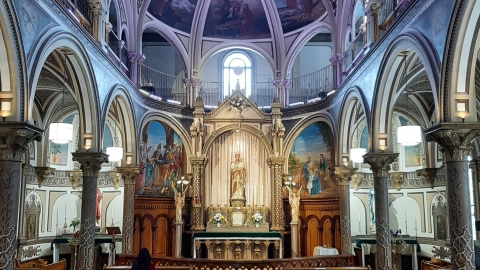Progressive Priests Progressively Married?

Padre Antonio Jose De Almeida
The post-synodal exhortation Querida Amazonia (February 2, 2020) remained silent on the question of married priests and that of women deacons, but that does not mean that these two demands have been abandoned by progressive theologians.
Regarding married priests, on May 15, 2020, the Vaticanist Sandro Magister, on his blog L’Espresso/Settimo Cielo, has reported the disturbing words of Fr. Antonio José De Almeida, priest of the diocese of Apucarana in southern Brazil, and professor at the Catholic Pontifical University of Paraná.
This priest is known for having developed the ultra-progressive proposals put forward by Msgr. Fritz Lobinger, Bishop of Aliwal, South Africa, from 1987 to 2004, who envisions “parishes led by ‘teams of elders’ made up of men or women, unmarried or married, ordained priests, and therefore with the power to celebrate Mass.” Pope Francis has repeatedly cited Bishop Lobinger’s proposals as avenues of reflection, without ever condemning them.
For Fr. De Almeida, who writes in the Italian review Il Regno in April 2020, the pope’s silence on the question of married priests does not indicate a renunciation. It will just have to be done in stages. “The “first step will consist in ‘lining up the reasons why a diocese intends to propose the ordination of married men.’ This first step could be taken by one diocese alone, but ‘it would be better to decide it with the neighboring dioceses, perhaps at the level of the ecclesiastical province or regional episcopal conference.’ And this ‘would be the second step.’”
The “third step” comes once the “plan” has been developed and consists in “presenting the request to the Holy See.” To the question by the journalist from Il Regno: “And will the Holy See accept it?” Fr. De Almeida replied with confidence, “‘Of course the Holy See could do so. In the Amazonian context and considering the synodal process set in motion after the announcement of the special synod for the Amazon, I have no doubt.’”
According to the Brazilian priest, “It could also happen that in the meantime an ‘Amazonian rite’ might be established in the region along the lines of the sui juris Churches, such as the Greek-Catholic, in which the married priesthood is present. In which case ‘everything would change,’ because the married priesthood would also be part of this new autonomous rite. So much so,” he reveals bluntly, “that ‘note 120 of Querida Amazonia which speaks of it, is already interpreted by some from the perspective of note 336 of Amoris Laetitia, which opened the door to communion for the divorced and remarried.’”
Sandro Magister recalls that note 120 of Querida Amazonia says nothing more than: “During the Synod, there was a proposal to develop an “Amazonian rite.” Just as notes 336 and 351 of Amoris lætitia only make allusions to communion for the divorced who have civilly remarried: “In certain cases, this can include the help of the sacraments…The Eucharist is not a prize for the perfect, but a powerful medicine and nourishment for the weak… Discernment can recognize that in a particular situation no grave fault exists….”
The Roman Vaticanist adds: “But just as in Amoris laetitia these allusions acted as leverage for an extensive - and for many abusive - application of the post-synodal apostolic exhortation, authorized by Pope Francis himself, so also there are those who would like this to happen with that little footnote from Querida Amazonia.”
(Source : Settimo Cielo – trad. à partir de diakonos – FSSPX.Actualités - 24/06/2020)



